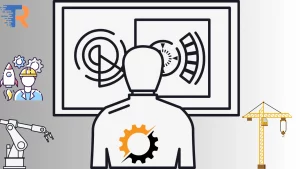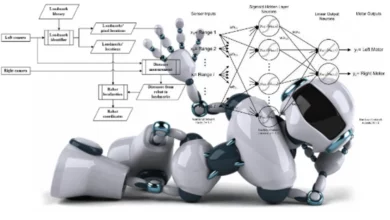
Go on a journey into the thrilling world of robotics engineering, where creativity knows no boundaries. Robotics engineers play an important role in rising robotic systems that outperform human and nonhuman skills.

In the arena of Robotics Engineering Career 2024, your tasks will include designing, structure, keeping, and fixing robots, as well as original research and developing revolutionary applications. Technology refers Hangout further into the exciting empire of robotics engineering as we undo the spirit of this subject, specifying the essential skills and providing visions into making your own career as a robotics engineer.
Understanding Robotics Engineering:
Robotics engineering is the complex skill of designing, manufacturing, and engineering robots. This arena is not simply academic; it is a hands-on, practical design profession that flourishes in the empire of front-line study.
Roles and Responsibilities:
Your inspiration as a robotics engineer extents multiple industries, in addition to automotive and space, as well as industrial, defense, and medicine. Your work could include important computer-aided strategy for new goods or hands-on building of samples for thorough testing. For people working in industrial, on-site management of robots on assembly lines is part of the daily routine. Attending professional discussions is vigorous for staying ahead of the curve in this ever-changing business. These gatherings not only sponsor the exchange of fresh ideas among professionals, but also help as a stage to adopt the most recent technology advances.
Specialization Chances:
In the many areas of robotics engineering, specialization gives avenues for discovering serious areas such as:
- – Mobility Motion
- – Sensing and Insight
- – Operator Interface
- – Manipulators and Effectors
- – Programming

The Robotics Engineering Career 2024 possibilities a thrilling trip into the future, where your skill will have an important impression on the world. Join the positions of thinkers and modernizers, redefining the site of robotics engineering with creativity, ability, and a energy for radical developments.”
“Discover Various Paths in Robotics Engineering Career 2024”
Discover the many chances in the field of Robotics Engineering Career 2024, where specialization matches with your desire and skill. Hangout into the empire of robotic engineering, where experts build radical answers modified to many industries, like automotive and space survey, healthcare, and defense.
Specializations in Robotics Engineering:
An inclusive variety of specializations expect you in the huge field of robotics engineering, permitting you to modify your career to your interests and skill. Consider structure robotic arms for the automobile industry, contributing to space study actions, or creating specialized robots for surgical treatments or military help. The field associations electrical engineering, mechanical engineering, and computer systems engineering, allowing several specializations such as:
- – Air Traffic Management Systems
- – Artificial Intelligence Robotics
- – Automation
- – Bio-Cybernetics
- – Computer Software Development
- – Computer-Aided Manufacturing
- – Control Systems
- – General Robotics
- – Intelligent Systems
- – Medical Robotics
- – Micro-Robotics
Profession Chances for Robotics Engineers:
As a robotics engineer, you are ready to make a difference in a amount of fields, including:
- – Manufacturing plants: Building, maintaining, and troubleshooting robots.
- – Technology companies: Designing personal and domestic robots.
- – Universities: Conducting research on human-machine interaction and robotic advancements.
- – Industrial research: Developing and building innovative robotic design concepts.
Key Skills Required:
Succeeding in this front-line, complex area needs special aptitudes and qualities.:
- Interest in How Things Work:
Recognize the mechanics, electronics, awareness systems, and the complex working of difficult machinery.
- Imagination:
Visualizing the movement and interface of robots within their environments.
- Decision-Making Skills:
Evaluating choices and making well-versed conclusions, especially in situations with blurred solutions.
- Math Skills:
Talent in progressive math, including algebra, geometry, measurement, statistics, and potentially calculus or trigonometry.
- Computer Skills:
Using computer software to create classy robot designs and test their performance in different settings.
- Practical Focus:
Applying practical and logical thinking to correct machines and enhance performance.
- Communication Skills:
Successfully conveying designs to related professionals in a clear and brief manner.
- Domain-Specific Skills:
Developing skill in certain domains, such as flexible leading metals for brain investigations or programming languages for independent robots.
Contribute on a gratifying journey where interest meets repeated learning to shape the future of robotics engineering in 2024. Your talents and desire are the activate for dramatic advances in this ever-changing sector.
“Choosing Your Course in the Changing Robotics Engineering Career Landscape 2024”
Discover the several environments where the skills of a robotics engineer are in high demand. Robotics Engineering Career 2024 offers many chances in a variety of industries, reflecting the ever-expanding applications of robotic technology.
Industries Looking for Robotics Engineers:
- Automotive Manufacturing:
– Major employers, leveraging robots for vehicle and parts manufacturing.
- Defense Contractors:
– Building military weapons with remote or automated operations, such as military drones and missile systems.
- Aerospace Firms:
– Using robotics engineers to design and produce rockets, satellites, and missiles, with robots helping in aircraft assembly and maintenance.
- Medical Equipment Manufacturers:
– Using robotics engineers to grow artificial members and prosthetics, as well as mix robotic surgical systems into medical operations.
- Research Firms:
– carrying out detailed studies on robotic technology and investigative its possible applications in many industries.
Salary and Career Outlook:
As the arena of Robotics Engineering expands rapidly, the prediction expects a notable annual growth rate of 28% from 2021 to 2030—meaningfully higher than the regular. Robotics engineers in the United States earn an regular yearly salary of $101,428, which includes base pay, profit sharing, and bonuses. Specific roles and their respective regular incomes include:
- – Robotics Electrical Engineer: $91,351
- – Robotics Software Engineer: $126,228
- – Automation Engineer: $98,712
- – Computer Vision Engineer: $142,032
Is Robotics Engineering Right for You?
Starting a career in robotics engineering can be quite rewarding, if you possess specific skills.:
- Commitment to Lifelong Learning:
– Staying abreast of technological advancements is essential in this dynamic field.
- Solution-Focused Mindset:
– Approaching issues with a focus on finding answers rather than becoming overcome by them.
- Attributes for Success:
– Creativity, honesty, professionalism, responsibility, good time management, and the capacity to manage many projects.
How to Become a Robotics Engineer:
Earning a bachelor’s degree is often the first step towards becoming a robotics engineer. Specializations could include:
- – Electrical/Electronic Engineering
- – Mechanical Engineering
- – Computer Science
- – Mathematics
- – Design and Technology
- – Computing and Programming

Go-getting robotics engineers often seek degrees in mechanical or electrical engineering with a robotics emphasis, which delivers access to basic courses such as mathematics, physics, mechanical design, and programming languages. Employer’s priorities’ abilities and knowledge, making a specific bachelor’s degree a smaller amount controlled.
Robotics Engineering Career 2024 signals individuals who are ready to face the challenges and progressions that untruth fast. Fuel your interest for technology, problem solving, and continuous learning on this energetic professional path.”
“Your Career in the Changing Field of Robotics Engineering 2024”
- Support Practical Experience:
While sure employers may accept new grads, genuine experience often separates applicants. Participate in practical schemes at your university or local robotics clubs, which will offer you with valuable experience. Consider paid or unpaid jobs with robotics businesses to gain practical experience with robots. Internships not only help you improve your skills, but they also connect you with tutors who can guide you as you begin your Robotics Engineering Career 2024. Some companies may even make available full-time service offers to their interns after graduation.
- Research into Advanced Education:
Consider earning a graduate degree to progress your position in the field. Many organizations look for candidates with master’s or doctoral degrees in robotics engineering or a similar field. Graduate programs make available an outline for detailed knowledge attainment via advanced project and research options. Master’s programs typically last two years, and doctoral degrees need four to eight years of dedication.
- Licensure and Certifications:
While licensure is not a fixed requirement for robotics engineers, getting professional authorizations can improve your career prospects. Engineers have the option to get a Professional Engineer (PE) license upon fulfilling the essential academic and practical training basics. While not compulsory, such certifications can decide you in the modest landscape of Robotics Engineering Career 2024, opening up new avenues for professional growth.”
Bottom Lines
Presentation a Thrilling Career in Robotics Engineering: Your Guide to Success in 2024. In the ever-changing scene of Robotics Engineering Career 2024, practical experience is vital. Set yourself different by joining in practical projects, volunteering, or internships. Consider gaining advanced degrees to enlarge your skill and improve your position in the profession. While licensure is elective, obtaining professional authorizations might improve your job prospects. Start your career with a devotion to frequent learning, problem solving, and implementation the breakthroughs that will shape the future of robotics engineering. Your route to success lies in this lively and exciting sector.
Read More:





